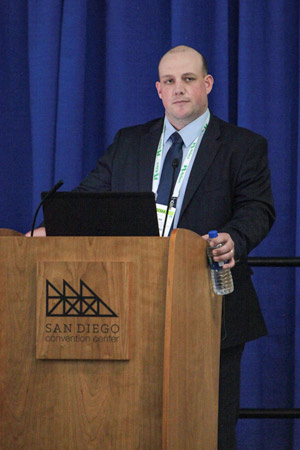
Golf courses big and small and at all compass points are struggling to fill maintenance positions in an evolving job market. Tuesday’s labor Power Hour at the 2022 GCSAA Conference and Trade Show aims to deliver solutions. Photo by Montana Pritchard
Just how does a panel of speakers discussing golf course management’s most pressing need — labor — plan to cover the myriad forces at play in a mere 60 minutes?
“Talk fast. Very fast,” says Tyler Bloom, one-sixth of the presenting team for the GCSAA Conference and Trade Show Power Hour “Strategies for Pushing Through Labor Challenges.” Bloom, a superintendent-turned-consultant, will be joined on the San Diego Convention Center’s Ballroom 20 stage at 11 a.m. Tuesday by:
- Josh Lewis, a former golf course superintendent now with APEX Turf Management and Consulting, a GCSAA Class A superintendent, and a 16-year association member.
- Jeff McFadden, CEO of The Union League of Philadelphia.
- Jacob Mendoza, GCSAA Class A superintendent at Detroit Golf Club and a 16-year association member.
- Shaun Marcellus, GCSAA Class A superintendent at Wanumetonomy Country Club in Middletown, R.I., and a 14-year association member.
- Brent Downs, CGCS, director of agronomy at Otter Creek Golf Course in Columbus, Ind., and a 15-year GCSAA member.
Bloom is a GCSAA Class A superintendent and 10-year association member who in June 2020 launched Tyler Bloom Consulting, a Bloomsburg, Pa.-based company focused on recruiting and workforce development in the turfgrass, green and club industries. While director of grounds and facilities at Sparrows Point Country Club in Baltimore, Bloom won GCSAA’s 2020 Leo Feser Award for the year’s best superintendent-authored article in GCM. His article detailed Sparrows Point’s partnership with a local organization that connects residents who have intellectual or developmental disabilities with employment opportunities.

For an hour on Tuesday, the panelists will dissect the massive employment challenges roiling the golf course management industry. Without giving too much away, Bloom (right) plans to address the need for facilities to provide fair compensation to their employees.
“I think, in general, clubs are learning how to operate with less,” he says, “whether it’s automation or scaling services so they’re focusing on what they do best. That varies from club to club. I think clubs have gotten away from being cheap, which they’ve been for a long time. That’s not an option now. (Potential employees) can go to a local fast-food chain or mom-and-pop that’s paying $15, $16 an hour, plus benefits, plus education. How do you compete with that? Clubs either have to scale up or eliminate services. I think for anybody in this industry, that trend hasn’t really changed, but it’s amplified now.
“I see this, from having done equipment manager services or assistant services, the theory of building from within, of formalized training and education. Clubs haven’t had to do that before, and it’s almost a necessity. There is not a huge supply of industry-trained workers. There was one club thinking about offering $100,000-plus for an assistant, just so they could keep them. It’s like a 911 emergency situation they’re dealing with. When you don’t have a pipeline to pull from, you have to compensate people.”
Bloom stresses his talk won’t resonate only with representatives from clubs that can afford a six-figure assistant superintendent.
“It doesn’t matter if it’s an elite, top-100 facility or a muni in a remote location, on an island, so to speak,” Bloom says. “It should be practical to any attendee. There’s a whole range of recruitment incentives and innovative ideas to reach a different audience, different retention tools. There’s a lot of content to pack in.”
Editor’s note: In Golf course labor: Bridging the Gen Z generation gap, a superintendent shares what he has learned managing high school- and college-aged crew members, and offers advice on helping your youngest staffers — and, in turn, your operation — thrive.
In Bloom’s view, traditional recruitment and retention strategies no longer work. Think you need Indeed? Indeed, you don’t.
“A lot of the challenges right now are, how do we accomplish adequate compensation?” he asks. “We’re able to give some people insight in trends in compensation — creative ways clubs are doing that.
“One successful trend now is sign-on bonuses, referral bonuses. One course offers a $350 bonus. If they stay on, they get another $350 bonus. What clubs have realized is that, by doing that, they can create internal recruiters, instead of spending that money on Indeed. Maybe your internal team can help recruit your future workforce.”
He’s also a big proponent of recruitment via new media — a “day-in-the-life” of a maintenance worker page on a club’s website, for example, or TikTok videos.
“Should we use those methods? The short answer is, yes, we should use it all,” Bloom says. “It all comes down to, what carrot are you going to dangle over their heads? Being outdoors and being in this environment aren’t enough. That obviously changes compensation and benefits structures. It’s how you treat your employees and work-life balance. It puts a lot of pressure on superintendents. That’s where they have to educate their stakeholders, so they need that education and the data.”
In additional to the in-person Power Hour, the panel will hold a virtual version of the discussion on Wednesday, Feb. 23 from 1:30-2:30 p.m. (CST) as part of the post-show virtual education lineup.
Andrew Hartsock is GCM’s managing editor.